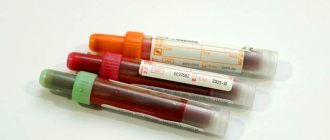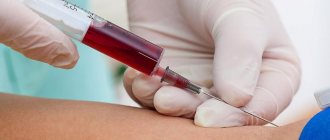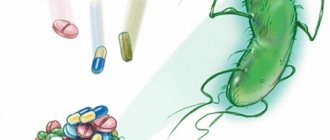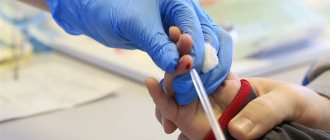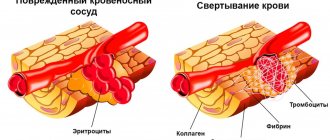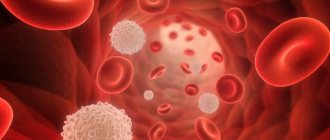Lymphocytes are the main cells of the immune system, which are responsible for all of our internal defenses. Lymphocytes are white blood cells that are the main cells of the immune system. Their task is to stand on our internal genetic purity.
Online consultation with infectious disease specialist, allergist-immunologist Natalia Nikolaevna Gordienko
Cost of online consultation: 3500 rubles
Online consultation
During the consultation, you will be able to voice your problem, the doctor will clarify the situation, interpret the tests, answer your questions and give the necessary recommendations.
Causes of lymphocytosis
If a baby is diagnosed with lymphocytosis, this is the first sign of progression of some disease in the body. Increased lymphocytes in the blood of a child indicate that the body is finding it difficult to cope with a progressive disease; an increased number of white blood cells is a sign of the fight against an infectious agent.
The main reasons for the increase in lymphocytes in a child include various diseases, among which it is necessary to highlight:
- hepatitis;
- measles;
- rubella;
- colds;
- whooping cough;
- tuberculosis;
- the presence of parasites in the body;
- herpes infection.
Also among the diseases it is necessary to note toxoplasma, adenoviruses, chickenpox, brucellosis. There are also serious diseases, for example, malignant thymoma, Smith or Franklin disease, leukemia. If lymphocytes are elevated in a child, this is not a sign of the development of a tumor disease or viral infection. This manifestation may be due to the fact that the baby’s body lacks the necessary vitamin complex, for example, B12. Take into account! After taking medications that inhibit neutrophils, it is not recommended to take a blood test for some time (unless there is an urgent need), since the child’s lymphocytes will be higher than normal.
Non-infectious diseases may also be among the reasons for the increase in lymphocytes in a child’s blood. These include:
- insufficient amount of vitamin (this leads to the development of vitamin deficiency);
- bronchial asthma;
- hyperthyroidism.
Elevated rates indicate the development of autoimmune diseases. The same indicators will be after removal of the spleen or the results of exposure to a certain number of medications.
Indications for analysis
A general blood test for lymphocytes is prescribed if there is a suspicion of an increase or decrease in their number. The analysis can be prescribed for other reasons; it allows you to obtain a lot of valuable data about the state of the blood and the whole body. The main indications include:
- Detection of the immune response to the presence of pathogenic microorganisms.
- The state of human immunity.
- Physical and chemical composition of blood.
- Preventive analysis - to detect hidden changes in the blood formula that do not manifest themselves with specific symptoms.
Symptoms
Elevated lymphocytes in a child are accompanied by the following symptoms:
- dyspnea;
- deterioration of general condition;
- fever;
- lethargy;
- sleep disturbance;
- the appearance of a rash;
- increase in body temperature.
The child will become capricious and his lymph nodes will enlarge. Against the background of the disease, the spleen and liver may increase in size.
Take into account! After recovery, the level of lymphocytes does not stabilize immediately; this may take from several weeks to several months. The process of lowering the level of lymphocytes is gradual.
When to see a doctor
If you have any of the above diseases and symptoms, you should consult a doctor. The doctor will assess the situation, taking into account the baby's age. If a child has elevated lymphocytes, then blood donation is prescribed to check the level of monocytes. If it is exceeded, this is a sign of a viral infection.
An immunologist-infectious disease specialist at Meditsina JSC (academician Roitberg’s clinic) will determine the cause and eliminate it in a short time, carrying out a suitable diagnosis. The clinic is located in the center of Moscow.
Diagnostics
Diagnosis depends on the cause, on what is affecting the child’s body that led to an increased level of white blood cells. The main diagnostic methods include computed tomography or ultrasound. A number of laboratory tests are also prescribed, and the child is required to undergo a blood test. Diagnostics allows you to draw conclusions, determine the level of danger and risks, and prescribe effective treatment (depending on what was the cause).
When is the test prescribed?
A clinical blood test with a leukocyte formula is indicated for patients with various pathologies. It allows you to assess a person’s health status with a comprehensive and timely diagnosis of diseases, including those occurring in a latent form.
Indications for a clinical blood test with a leukocyte formula are:
- medical examination or routine medical examination;
- preparation for surgical treatment;
- infection or suspected infection;
- suspicion of inflammation or parasitic infestation in the patient’s body;
- allergic reactions;
- prescribing certain medications;
- monitoring the effectiveness of treatment.
Before donating capillary blood, it is recommended not to drink alcohol during the day, not to eat for 2-3 hours, not to smoke for 30 minutes and to avoid stress and excessive physical activity.
Treatment
If the child’s lymphocytes are higher than normal, the doctor determines the cause and selects the most effective treatment. Elevated lymphocytes in the child’s blood indicate that the immune system is resisting the disease developing in the body. Medicines are not prescribed in this situation. The first thing the specialist recommends is to improve the baby’s daily routine, which should consist of proper sleep patterns, walks in the fresh air, and rest. If lymphocytes in a child’s blood are elevated, you need to provide him with adequate nutrition.
If the process is accompanied by elevated temperature, the doctor may prescribe antipyretic drugs. Also, in some cases, medications are prescribed that have anti-inflammatory and antiviral effects. Another task for the specialist is to determine whether the child’s lymphocytes are elevated as a result of a tumor or not. If the cause is a tumor, the doctor’s further tactics are determined by the form of the tumor and the activity of development. In this situation, the doctor may prescribe chemotherapy or a bone marrow transplant. It is not recommended to ignore the symptoms or doctor’s recommendations by self-medicating.
Prevention
To prevent elevated lymphocytes in a child’s blood, you need to adhere to the following preventive actions:
- proper nutrition (the diet should be balanced);
- playing sports (loads should be moderate);
- avoid hypothermia (dress your baby according to the weather);
- regular examination by doctors.
It is recommended to regularly take blood tests to ensure that your baby does not form bad habits.
Why is a leukocyte blood formula needed?
The leukocyte formula is the percentage of leukocytes in the blood serum (eosinophils, neutrophils, lymphocytes, basophils, monocytes).
This analysis allows you to determine the current state of the immune system, identify inflammatory processes in the patient’s body and determine the etiology of allergies. It is known that leukocytes protect the human body from dangerous microorganisms. One of the main tasks of leukocytes is the destruction of foreign particles. If an inflammatory process occurs in the patient’s body, it is immediately reflected in the leukocyte count.
Complete blood count (CBC/Diff - 5 fractions of leukocytes) - capillary blood in Moscow from day 1
from 290 ₽
Sign up
Clinical blood test (CBC/Diff - 5 leukocyte fractions) + ESR in Moscow from day 1
from 294 ₽
Sign up
Complete blood count (CBC/Diff - 5 fractions of leukocytes) in Moscow from 1 weekday
from 290 ₽
Sign up
When leukocyte counts change in the blood, it is necessary to determine in which direction the deviation occurs. This study will help you quickly find the problem and make a diagnosis. However, it should be taken into account that changes in blood parameters without in-depth diagnostics are not a characteristic and final sign for making a diagnosis.
Leukocyte blood count: interpretation of results
Increasing performance
An increase in neutrophils in the blood occurs during infectious diseases and during some specific patient conditions. For example, in acute infectious diseases, candidiasis, rheumatism, tumor processes, lead or mercury poisoning, during diabetes. Also, an increase in the number of neutrophils can be influenced by conditions not associated with diseases, for example: severe physical exertion, stressful situations, overheating or hypothermia.
An increase in the number of lymphocytes indicates the presence of an infectious disease, blood pathology, lead or arsenic poisoning. Some medications can affect the increase in lymphocytes.
A previous infectious disease affects the increase in monocytes. Monocytes increase in autoimmune diseases, in the presence of cancer, and during carbon and phosphorus poisoning.
An increase in eosinophils occurs in response to allergic reactions, when taking certain antibiotics, medications for tuberculosis and convulsive conditions. Parasitic infections, diseases of the skin and respiratory system, and the acute course of an infectious disease can also change the indicators.
Basophils in the blood increase during influenza, chickenpox, tuberculosis, allergic reactions, ulcerative colitis due to increased sensitivity to any food, and an increase may also indicate the presence of cancerous tumors in the body.
Decrease in indicators
If the number of neutrophils decreases, the doctor may suspect that the patient has an infectious disease, hypersensitivity to drugs, anemia and anaphylactic shock.
Lymphocytes decrease in conditions of immunodeficiency, acute inflammatory processes in the body, renal failure and systemic lupus erythematosus.
A decrease in monocytes occurs during oncohematological diseases, purulent infections and aplastic anemia, the use of certain drugs and in a state of severe shock.
The decrease in eosinophils is affected by severe purulent infection and heavy metal poisoning.
Pregnancy, severe stress and the period of ovulation can be a natural cause of a decrease in basophils. Pathological causes include infectious diseases and Cushing's syndrome.
Do I need to prepare for the analysis?
To obtain a more reliable picture of a blood test, preparation is necessary for its implementation.
Mode
Before the analysis, it is not recommended to eat food 12 hours before the test (in children under 1 year, several hours).
Medications
Some medications can distort the blood picture. Such drugs include glucocorticoid hormones, chemotherapeutic drugs, cytostatics, and neuroleptics.
What can distort the results
Stress, heavy physical activity, food, and taking certain medications can distort the results.
Approaches to the treatment of conditions in which lymphocytes in the blood of a child increase
Treatment of children with lymphocytosis depends on the cause that caused such changes in the general blood test. If we are talking about a viral infection, then treatment in most cases is symptomatic. That is, at a high temperature, antipyretic drugs are given, in the presence of rhinitis, nasal sanitation is prescribed, in the presence of a cough, antitussive drugs and/or inhalation therapy, and so on.
Be sure to prescribe plenty of fluids and bed rest for the febrile period.
To date, there are no antiviral drugs that have undergone multicenter randomized studies indicating their effectiveness!
Therefore, the prescription of these drugs, which have flooded the entire pharmacy chain with beautiful advertising and promises of a quick recovery, is not justified. The only exceptions are drugs such as oseltamivir (used for influenza), acyclovir (prescribed for herpes infections and in some cases for chickenpox) and ganciclovir and its derivatives (for cytomegalovirus infection). It should be mentioned that the currently popular homeopathic medicines in the treatment of viral infections also have no effectiveness, that is, they do not work.
For some viral (measles, rubella, hepatitis B and A, mumps) infections, the only effective means of prevention today remains vaccination.
For the development of these diseases, etiotropic treatment, that is, acting on a specific pathogen, is not available anywhere in the world today!


